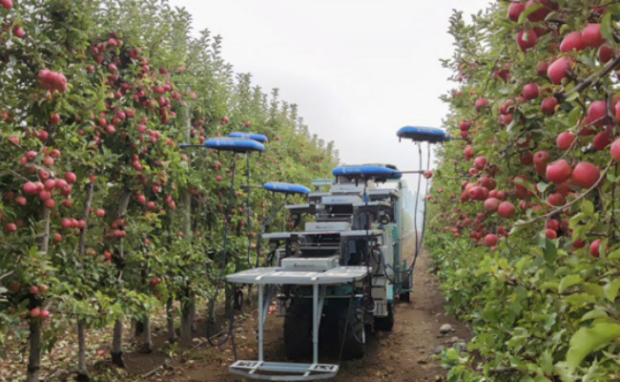Kudos apple unveiled by University of Minnesota
The University of Minnesota announced it created a new apple variant called “Kudos.” Minnesota Public Radio (MPR) says it is a cross between the popular Honeycrisp and Zestar varieties and the University’s 29th apple variety. Also, Kudos marks the 115th year anniversary of the Minnesota University’s apple-breeding program.
It’s interesting to see we still create new varieties of fruits and vegetables. Despite cultivating them for thousands of years, we still find new ways to improve our food. Thanks to the latest technological advances, we can develop such marvels. Even better, artificial intelligence would likely help us create more wonderful treats.
This article will discuss how the University of Minnesota created the Kudos apple. Then, I will explain how emerging technologies could make their process more efficient than ever.
How did the University of Minnesota create the Kudos apple?
Introducing Kudos™, the University of Minnesota’s 29th apple release! The gorgeous red apple has a crisp, juicy texture, and a sweet, well-balanced flavor, with occasional tropical undertones.https://t.co/QDMDdc8jVp pic.twitter.com/iD4Fzknkyn
— UMN Horticulture (@UMNHorticulture) September 21, 2023
The University of Minnesota website calls the Kudos brand MN33. Also, the University says it “produces well-colored fruit with a unique combination of traits including an excellent crisp, juicy texture and a sweet, well-balanced flavor with occasional tropical overtones.”
The U of M created it by mixing its other apple-breeding creations, the Zestar and the Honeycrisp. University apple breeder David Bedford said the former is “known for its rich, full flavor, excellent for fresh eating and baking.”
Meanwhile, the Honeycrisp “is certainly known for its crisp, explosively juicy texture.” As a result, Bedford says these helped the university create the “perfect apple,” the Kudos.
Minnesota Public Radio says the unique variant took 22 years to breed and develop. In contrast, most varieties take 20 to 30 years, and the Honeycrisp took 30.
The process involves crossing parent apples to generate thousands of seeds. “Only one out of 10,000 of those, seeds which become trees, is good enough to be named and released.”
You may also like: Globe launches 5G SA Technology
“A lot of the time we spend in those 22 years is throwing away the ne’er-do-wells, and the almost-goods and the pretty-darn goods, but only a few of them are good enough to really be released. And that’s the case with Kudos.”
MPR says an apple variety must meet 20 criteria like taste, texture, and color to be ready for release. “Boy, if it doesn’t have that texture and flavor, it’s out for us. We just have no tolerance for mushy apples. We don’t have any tolerance for poorly flavored apples.”
Kudos apples are an “open variety,” which means growers can buy trees from University of Minnesota-licensed nurseries. However, it won’t be available in stores for three to four years.
How can AI improve apple breeding?

Photo Credit: tech.news.am
The latest artificial intelligence tools could significantly expedite the creation of new varieties like the Kudos apple. For example, the Avalo AI program could facilitate identifying and crossing genes for new fruit.
It can simulate the effects of changes to a plant’s genome. Consequently, you can reduce the usual 15-year development time to two or three. Avalo CEO Brendan Collins said, “The idea was to create a much more realistic model for the genome that’s more evolutionary aware.”
These simulations consider biology and evolution to reduce false positives. As a result, they could significantly reduce research times for new fruit and veggie variants.
You may also like: Indonesian zoo breeds Komodo dragons
“You can design the perfect genotype in silico [i.e., in simulation] and then do intensive breeding and watch for that genotype,” said Collins. However, this tool was initially for boosting food yields in countries near the equator.
Collins explained, “There are big decreases to yields in equatorial areas, and it’s not that corn kernels are getting smaller. Farmers move upland because saltwater intrusion is disrupting fields, but they run into early spring frosts that kill their seedlings.”
“Or they need rust-resistant wheat to survive fungal outbreaks in humid, wet summers. We need to create new varieties if we want to adapt to new varieties if we want to adapt to this new environmental reality.”
Conclusion
The University of Minnesota recently announced its latest apple variety, Kudos. It is a combination of the Zestar and Honeycrisp varieties, producing one with a well-balanced flavor and tropical overtones.
We would have to wait three to four years before the fruit becomes widely available. After all, commercial orchards need time to grow and mature seeds into trees.
Perhaps the U of M can apply the latest artificial intelligence tools to produce more unique varieties faster. See what else science and technology can do at Inquirer Tech.